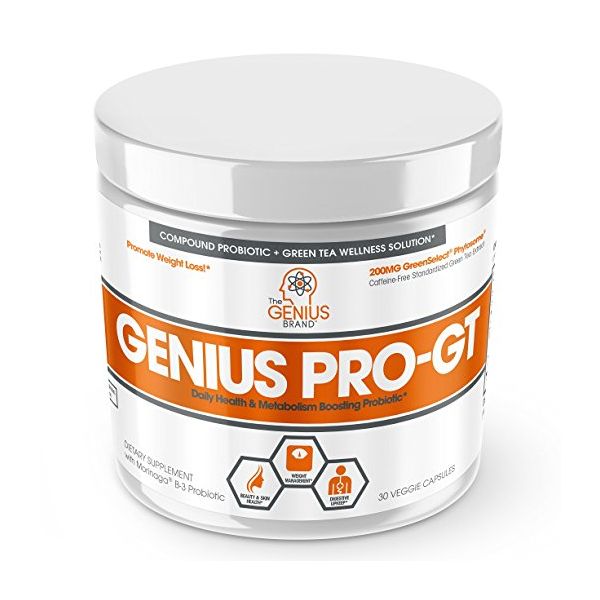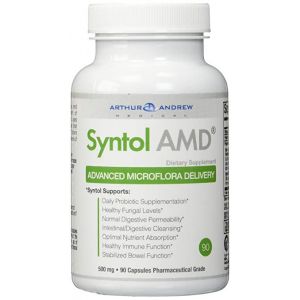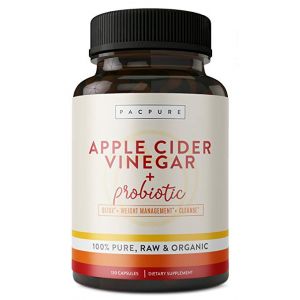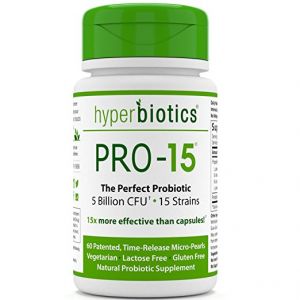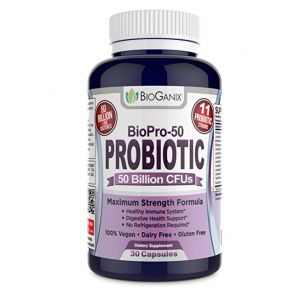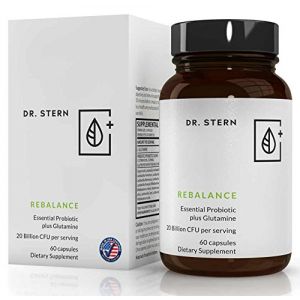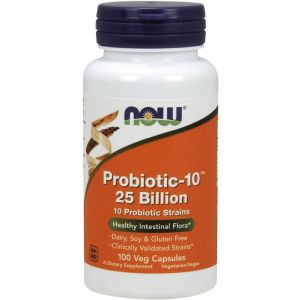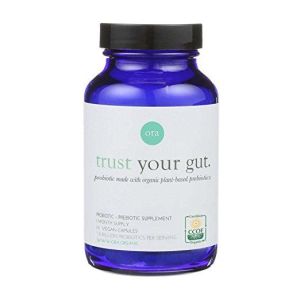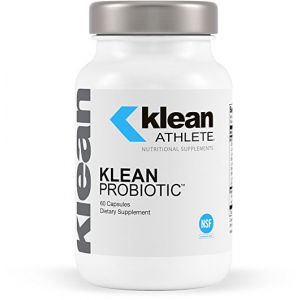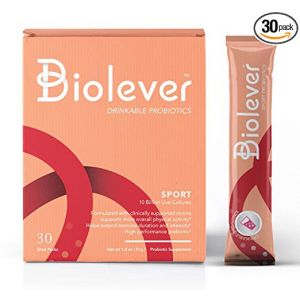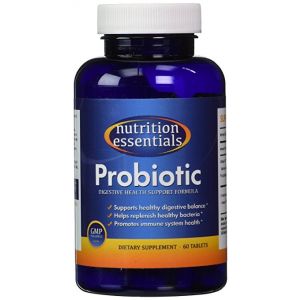Genius Probiotics for Weight Loss w/ Green Tea Extract
30 Veggie Capsules
Compound probiotic and green tea extract supplement for heightened daily health, optimal digestion, and sustained weight management. This exceptional formula boosts the metabolism, works faster, is more beneficial than a low calorie diet alone, is clinically supported, and beneficial for both men and women.
Best For
Improved digestion, Enhanced immunity, Increased energy levels, Heightened nutrient absorption, Supports weight control [1-5]
Results
5/5
- Pros:
- Superior quality probiotic with green tea for daily health support and better digestion
- Helps maintain weight control
- For men and women
- Supports healthy cholesterol levels
- Metabolism booster
- Fast working formula enhances the benefits of a low calorie diet
- Slims down the waist line
- Lessens bloating
- Contains antioxidants that target oxidative stress
- Promotes healthy immune system function
- Helps maintain heart health
- Clinically supported ingredients
- Room temperature stable
- Caffeine-free
Ingredients Concern: None discovered
Cons: Keep out of reach of children, Consult your physician prior to using this product if you are pregnant, nursing, under 18 years of age, taking medication or have a medical condition, Immediately discontinue use and contact your physician if any adverse reactions occur, Store in a cool, dry place away from excessive heat, Probiotics may cause stomach discomfort in some people
Probiotics have been shown to improve allergic reactions and skin allergies in children [5], most of which are linked to the environmental exposure to allergens such as dust mites, dog or cat hair, and pollen.
Furthermore, taking probiotics during pregnancy and adding probiotics to the diet of newborns helps target inherited skin problems [6]. In addition, the protection that probiotics provides for skin cells persists for years when the supplementation begins during infancy [7].
Probiotic supplementation is also associated with a reduced incidence of duration of diarrhea that is due to antibiotic use [8]. In addition, probiotics are frequently administered in hospital settings to target diarrhea that is caused by antibiotics [9]. In NICUs, probiotic supplementation is also used to boost health and target diarrhea in newborns [10].
Research shows that taking a minimum of 5 billion CFUs of probiotics daily promotes health in children, they can be taken safely on a regular basis, they do not typically interact with any medication, and they rarely cause adverse effects [5]. Research indicates that the daily serving of probiotics which supports optimal digestive and immune system function for adults is 10 billion CFUs [1, 5]. In addition, probiotics support healthy cholesterol, triglyceride, and liver fat levels, thereby promoting a healthier metabolism [18]. They also help improve the body's ability to degrade cholesterol which enhances weight control [18, 19]. Green tea contains antioxidants such as epigallocatechin gallate (EGCG), which has been shown to improve energy levels and overall health by boosting blood flow, immune system and hormonal activity, and cellular health [20-23]. It also enhances metabolism, which promotes stamina as well as improved weight control [21]. The EGCG in green tea also combats UV-induced DNA damage [24].
Improved digestion, Enhanced immunity, Increased energy levels, Heightened nutrient absorption, Supports weight control [1-5]
Probiotics restore and maintain a healthy balance of good bacteria in the gut [1]. Probiotics also release enzymes that promote the digestion of food and enzymes that target bad bacteria as well as other harmful invaders, thereby improving overall digestive function [11]. In addition, they support the proper breakdown and transport of nutrients into the bloodstream and throughout the body [4]. By improving the digestive process, probiotics helps ensure that only low amounts of undigested food remain in the gut as undigested food often leads to stomach discomfort. In doing so, probiotics target bloating, constipation, gas, and diarrhea, especially when antibiotics are being taken [8].Probiotic supplementation is frequently recommended during and after antibiotic use because it restores healthy levels of good bacteria [9].
Probiotics boost natural antioxidant activity in the body and this takes some of the strain off of the immune system [12]. Therefore, immune system becomes stronger and more readily available to target foreign invaders due to added protection that is provided by probiotics.
Probiotic supplementation during childhood enhances digestive health and immunity [5]. More specifically, young children who take probiotics have a less exaggerated immune response to allergens that may otherwise cause them to become hyper-allergic [13]. Furthermore, probiotics help disrupt an imbalance of pro-inflammatory and anti-inflammatory proteins [2].
In addition, probiotics play a protective role against common allergens due to their ability to improve the viscosity of the natural mucus lining in the airways that trap and excrete allergens [1]. This reduces reactions to allergens, including skin allergy reactions [5]. Probiotic supplementation in young children also disrupts harmful invaders from causing infections in the respiratory system because probiotics support increased levels of white blood cells and natural killer cells [14, 15]. Furthermore, probiotics release specific substances that have antimicrobial activity and this enhances immunity, respiratory health, and overall health [14, 16, 17].
Furthermore, clinical research indicates that probiotics support heart health and weight control by promoting the breakdown of cholesterol, triglycerides, and body fat in obese individuals and influencing the way cholesterol is absorbed in the gut [18, 19]. Green tea is well-known for boosting energy due to its epigallocatechin gallate (EGCG) content, but it also contains active substances called polyphenols (antioxidants), which stimulate the growth of mitochondria (energy-producing cells) and protect cells throughout the body from free radical as well as toxin-induced damaged [20]. The stimulation of mitochondria heightens blood circulation, enhances immune activity, and improves cell activity, all of which boost energy levels.
The EGCG in green tea is also a nutrient that regulates energy balance, hormonal activity, and metabolism [20-23]. In particular, EGCG supplementation heightens metabolism while at rest and during exercise, and this helps maintain an optimal energy balance when individuals are inactive or engaging in physical activity, but it also improves weight control [21]. In addition, the antioxidant properties of EGCG target oxidative stress-induced skin damage [24].
Key Ingredients: Morinaga B3 - Bifidobacterium breve [10 billion CFU], Greenselect green tea phytosome [200 mg]
All Ingredients: Morinaga B3 - Bifidobacterium breve [10 billion CFU], Greenselect green tea phytosome [200 mg], Hypromellos (Veggie capsules), Organic rice extract, Organic rice hulls, Ascorbyl (Vitamin C) Palmitate
As a dietary supplement, take one (1) capsule daily with morning meal.
These statements have not been evaluated by the FDA. These products are not intended to diagnose, treat, cure or prevent any disease.
1. Kechagia M, Basoulis D, et al. Health benefits of probiotics: a review. ISRN Nutr. 2013;2013:481651.
2. Doron S, Snydman DR, Gorbach SL. Lactobacillus GG: bacteriology and clinical applications. Gastroenterol Clin North Am. 2005;34(3):483-498.
3. Rask C, Adlerberth I, Berggren A, Ahren IL, Wold AE. Differential effect on cell-mediated immunity in human volunteers after intake of different lactobacilli. Clin Exp Immunol. 2013;172(2):321-332.
4. Sheridan PO, Bindels LB, et al. Can prebiotics and probiotics improve therapeutic outcomes for undernourished individuals? Gut Microbes. 2014; 5(1):74-82.
5. Kliglerr B, Cohrssen A. Probiotics. Am Fam Physician. 2008, 78(9):1073-1078.
6. Kalliomäki M, Salminen S, Arvilommi H, Kero P, Koskinen P, Isolauri E. Probiotics in primary disruption of atopic disease: a randomised placebo-controlled trial. Lancet. 2001;357(9262):1076-1079.
7. Kukkonen K, Savilahti E, Haahtela T, et al. Probiotics and prebiotic galacto-oligosaccharides in the disruption of allergic diseases: a randomized, double-blind, placebo-controlled trial. J Allergy Clin Immunol. 2007;119(1):192-198.
8. Hempel S, Newberry SJ, Maher AR, et al. Probiotics for the disruption and treatment of antibiotic-associated diarrhea: a systematic review and meta-analysis. JAMA. 2012;307(18):1959-1969.
9. Ouwehand AC, DongLian C, Weijian X, et al. Probiotics reduce symptoms of antibiotic use in a hospital setting: a randomized dose response study. Vaccine. 2014;32(4):458-463.
10. Deshpande GC, Rao SC, Keil AD, Patole SK. Evidence-based guidelines for use of probiotics in preterm neonates. BMC Med. 2011;9:92.
11. Manzoni P, Mostert M, Leonessa ML, et al. Oral supplementation with Lactobacillus casei subspecies rhamnosus disrupts enteric colonization by Candida species in preterm neonates: a randomized study. Clin Infect Dis. 2006;42(12):1735-1742.
12. Gomes AC, de Sousa RG, Botelho PB, Gomes TL, Prada PO, Mota JF. The additional effects of a probiotic mix on abdominal adiposity and antioxidant Status: A double-blind, randomized trial. Obesity (Silver Spring, Md). 2017, 25(1):30-38.
13. Prescott SL, Dunstan JA, Hale J, et al. Clinical effects of probiotics are associated with increased interferon-gamma responses in very young children with atopic dermatitis. Clin Exp Allergy. 2005, 35(12):1557-1564.
14. Wang Y, Li X, et al. Probiotics for disruption and treatment of respiratory tract infections in children: A systematic review and meta-analysis of randomized controlled trials. Medicine (Baltimore). 2016;95(31):e4509.
15. Guillemard E, Tanguy J, Flavigny A, et al. Effects of consumption of a fermented dairy product containing the probiotic Lactobacillus casei DN-114 001 on common respiratory and gastrointestinal infections in shift workers in a randomized controlled trial. J Am Coll Nutr 2010; 29:455-468.
16. Fooks LJ, Gibson GR. Probiotics as modulators of the gut flora. Br J Nutr. 2002;88 suppl 1:S39-S49.
17. Szajewska H, Konarska Z, Kolodziej M. Probiotic bacterial and fungal strains: claims with evidence. Dig Dis. 2016;34:251-259.
18. Costabile A, Buttarazzi I, Kolida S, et al. An in vivo assessment of the cholesterol-lowering efficacy of Lactobacillus plantarum ECGC 13110402 in normal to mildly hypercholesterolaemic adults. PloS one. 2017, 12(12):e0187964.
19. Famouri F, Shariat Z, Hashemipour M, Keikha M, Kelishadi R. Effects of Probiotics on Nonalcoholic Fatty Liver Disease in Obese Children and Adolescents. J Pediatr Gastroenterol Nutr. 2017, 64(3):413-417.
20. Rehman H, Krishnasamy Y, et al. Green tea polyphenols stimulate mitochondrial biogenesis and improve renal function after chronic cyclosporin a treatment in rats. PLoS One. 2013;8(6):e65029.
21. Hodgson AB, Randell RK, Jeukendrup AE. The effect of green tea extract on fat oxidation at rest and during exercise: evidence of efficacy and proposed mechanisms. Adv Nutr. 2013;4(2):129-140.
22. Boschmann M, Thielecke F. The effects of epigallocatechin-3-gallate on thermogenesis and fat oxidation in obese men: a pilot study. J Am Coll Nutr. 2007;26(4):389S-395S.
23. Thielecke F, Rahn G, Böhnke J, et al. Epigallocatechin-3-gallate and postprandial fat oxidation in overweight/obese male volunteers: a pilot study. Eur J Clin Nutr. 2010; 64(7):704-713.
24. Korać RR, Khambholja KM. Potential of herbs in skin protection from ultraviolet radiation. Pharmacogn Rev. 2011;5(10):164-73.
Write Your Own Review

